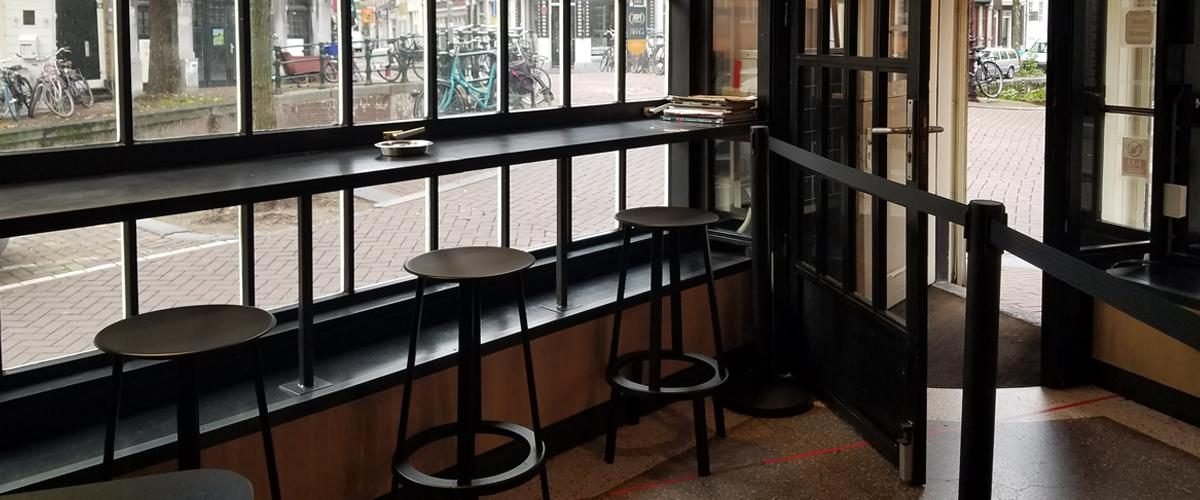Updated March 31, 2021.
DUTCH CURFEW WILL NOW BEGIN AT 10:00 PM
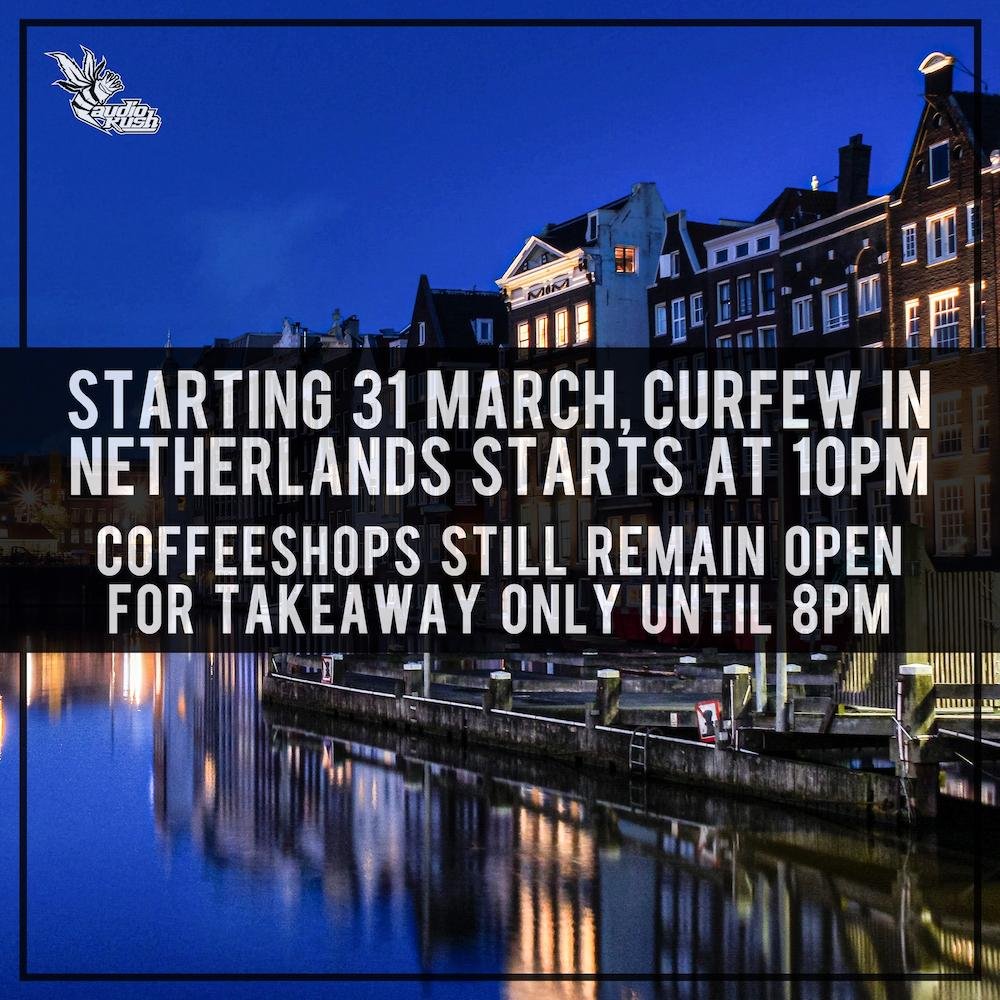
As of Wednesday 31 March, 2021 the curfew which has been in effect in the Netherlands since January 2021 has been eased, enabling residents and visitors of the country to be outside until 22:00.
Between the hours of 22:00 – 4:30, people risk being fined if they are outside without approved reason.
Updated March 23, 2021.
NATIONWIDE COVID-19 RESTRICTIONS WILL REMAIN IN EFFECT UNTIL AT LEAST 20 APRIL
A March 23 Press Conference by Prime Minister Rutte has addressed the increase in Netherlands COVID-19 infections and the idea that the nation is experiencing a third wave of infections at this time. There was hope that, if the nation was experiencing a downtrend in COVID-19 infections, terraces would be allowed to reopen at catering establishments, but this is not yet possible.
An April 13 Press Conference will readdress these concerns.
At this time, the government recommends against international travel until at least 15 May, 2021.
The government plans for COVID-19 self-test kits to be available beginning in the middle of April.
COVID-19 vaccinations in the Netherlands are currently offered on an invitation-only basis to ensure that those with the most need are able to receive the vaccination. All adults interested in receiving a vaccine will tentatively be able to receive their first dosage by July 2021.
Updated January 25, 2021.
The new curfew has generated a massive revenue in its first night.
Updated January 20, 2021.
LOCK DOWN EXTENDED
In a Wednesday afternoon address, Prime Minister Rutte discussed new measures to prevent further spread of COVID-19.
With the support of the House of Representatives, a curfew is expected to be imposed across the Netherlands, beginning this weekend, on the evening of Saturday, January 23.
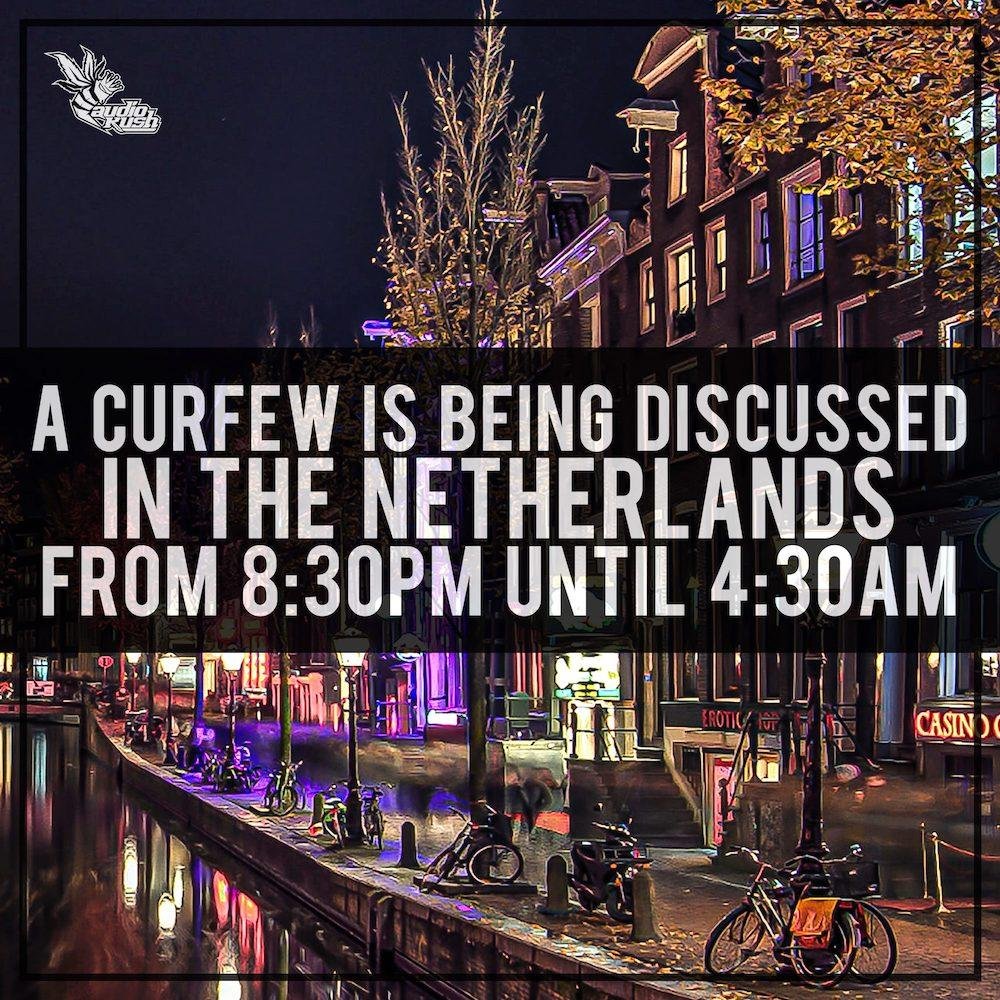
A €95 fine will be imposed to those found outside during the curfew hours of 8:30 p.m. to 4:30 a.m. There will be limited exceptions to this curfew, to include essential workers traveling to and from work.
“The government is very concerned about the British variant of the coronavirus, which is even more contagious than the virus we already know. In addition, there are other variants of the virus that are of concern. Extra measures are needed to get these new variants of the virus under control. That is why the cabinet intends to introduce a curfew within a few days of the consent of the Lower House. In addition, the cabinet is tightening up the advice for visits: receive a maximum of one person aged 13 or older per day and visit somewhere no more than once a day. Additional restrictions are also being introduced to counter the number of international travel movements”, states Rijksoverheid, the website officially representing the 12 Dutch governmental ministries.
“The aim is to lower the current level of infection, delay the spread of the current and new variants of the virus and ensure that the new variants enter our country as little as possible. This way we can postpone the moment when the new variants of the virus take over as much as possible. This is very important to ensure that hospitals keep room for corona patients in the coming months and so that other medical care can continue as much as possible. Because we do not want to look back at this moment in a few weeks and conclude that we have not done enough.”
Curfew Exceptions to Include:
-The case of a calamity
-If you, a person in need or an animal needs urgent (medical) help
-If your employer requires you to go out for work
-If you travel abroad or return to the Netherlands
-If you are on the road in connection with a funeral and can prove this
-If you are on the road in connection with a summons from a judge, public prosecutor or objection or appeal hearing and can prove this
-When walking a dog on a leash. You must do this on your own.
Those intending to travel outside during curfew hours must bring a ‘self-declaration curfew’ form with them when doing so. An employer’s statement is also needed in the case of those traveling to and from a place of employment. In some cases, a form will not be not required. More information can be found on the Rijksoverheid website.
This proposal from the cabinet will be considered by The House of Representatives in the coming days. As of now, the curfew is planned to last until February 10 at 4:30 a.m.
Updated January 12, 2021.
LOCK DOWN EXTENDED!
During yet another Tuesday evening Press Conference, Prime Minister Mark Rutte has announced that the 17 January end date for the current lockdown has been extended. Further extension of these measures will be discussed and addressed on 2 February, when there will be another Press Conference.
The lockdown is currently slated to last until February 9, 2021.
Updated December 14, 2020.
The Netherlands will begin the nation’s strictest lockdown of the pandemic on December 15.
New COVID-19 measures will begin on the 15th December at 00:00. These new measures will be in effect until 17 January, which means through Christmas, Hanukkah, and New Year’s Eve.
Updated October 28, 2020.
A Tuesday evening press conference by Minister Mark Rutte and Health Minister Hugo de Jonge did not offer any changes to existing COVID policy, but the minister did suggest that the current partial lockdown measures will likely be in effect at least into the beginning of December. “The numbers remain high and have to go down. . . The most important thing we can improve remains our own behavior,” the Prime Minister said during last night’s address.
The ministers and RIVM will continue to monitor this new wave of outbreaks and will address the nation again in one week on Tuesday, November 3, unless the situation worsens and requires them to do so earlier.
Updated October 22, 2020.
The enforcement of any mask wearing requirements appears to vary between establishments at this time. Shops continue to operate takeaway-only and with limited capacity. Some shops have been observed to be only allowing one individual inside at a time.
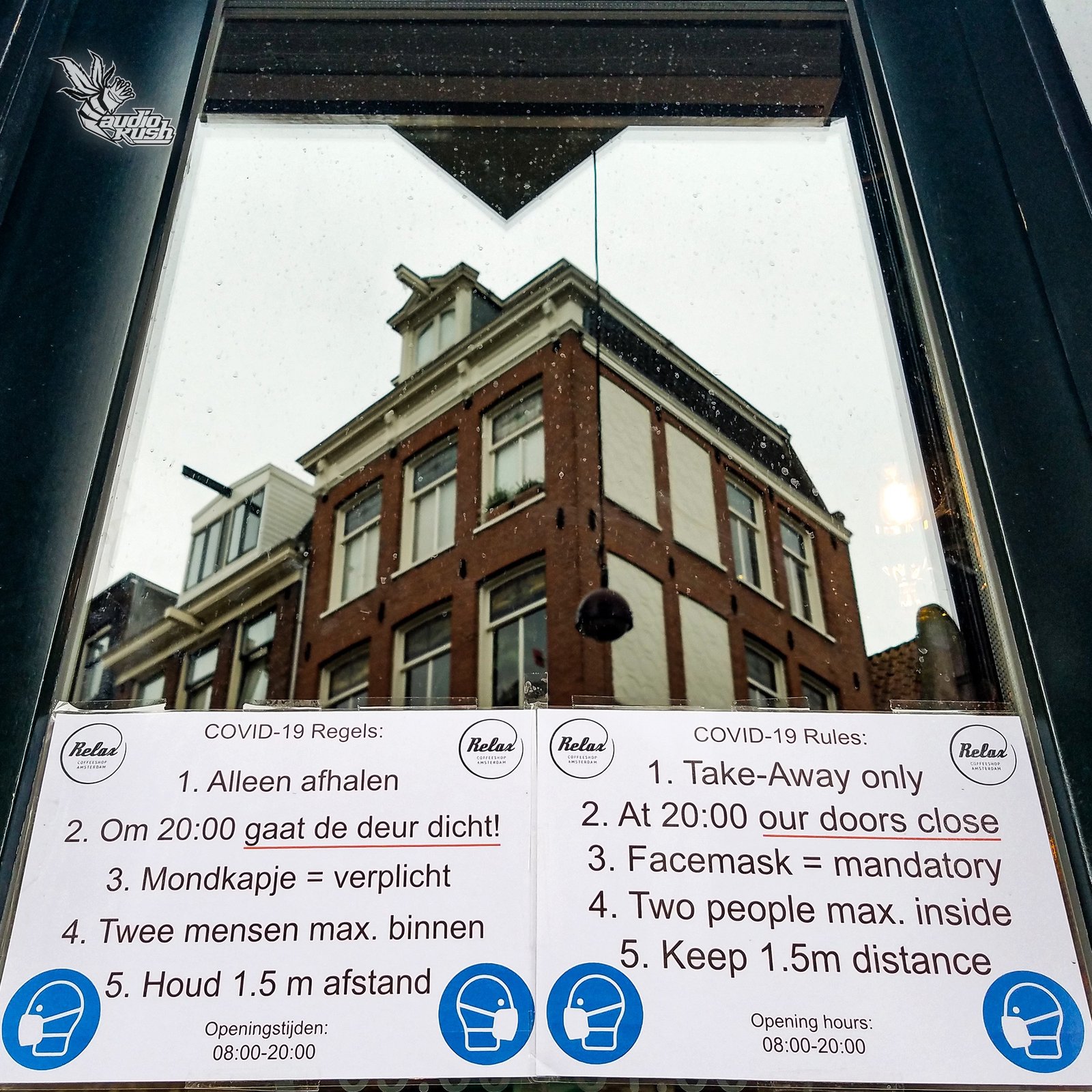
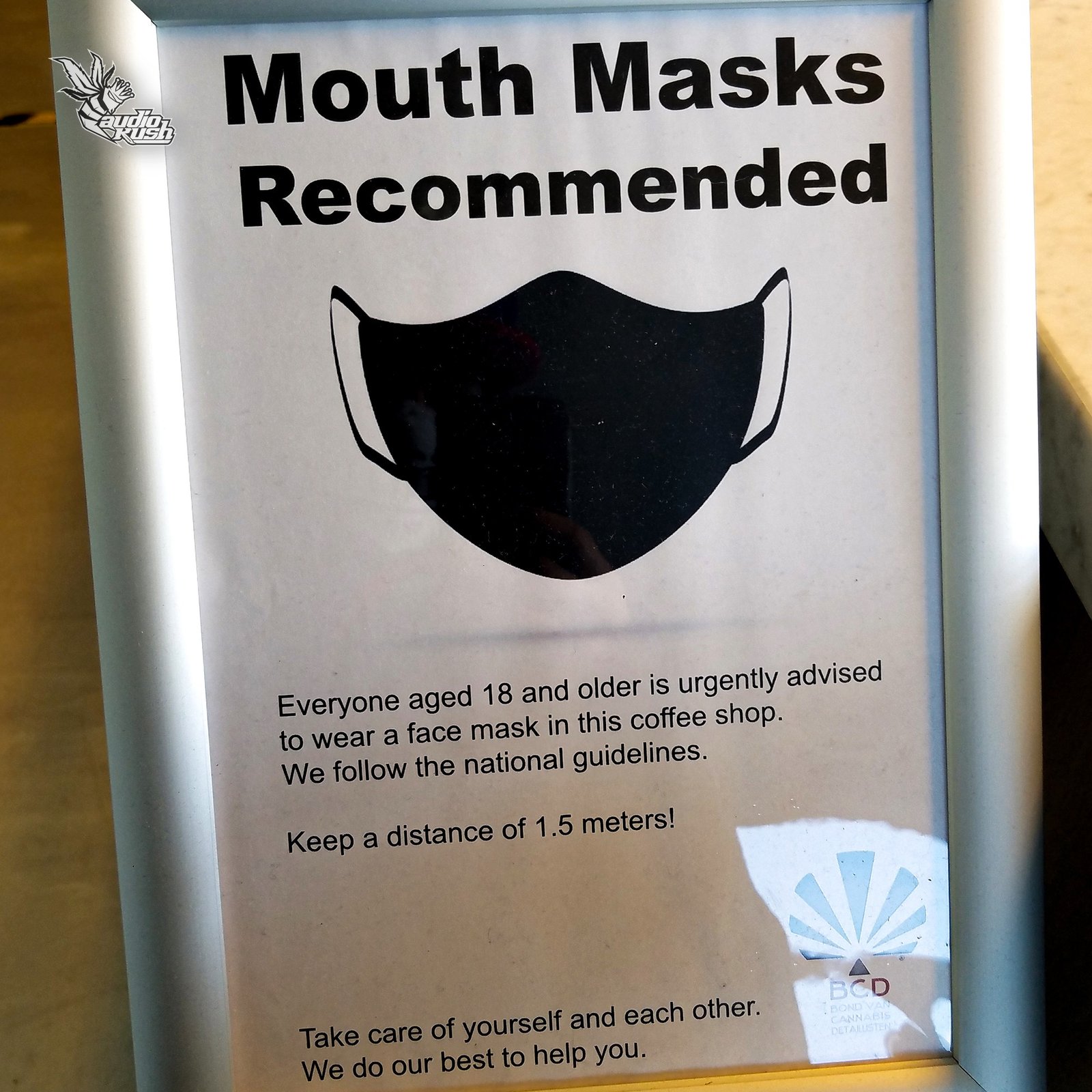
Updated October 15, 2020.
Initial regulation banning the carrying and consumption of cannabis products between 8:00 p.m. and 7:00 a.m. was altered after it was found to be in violation of the tolerance policy.
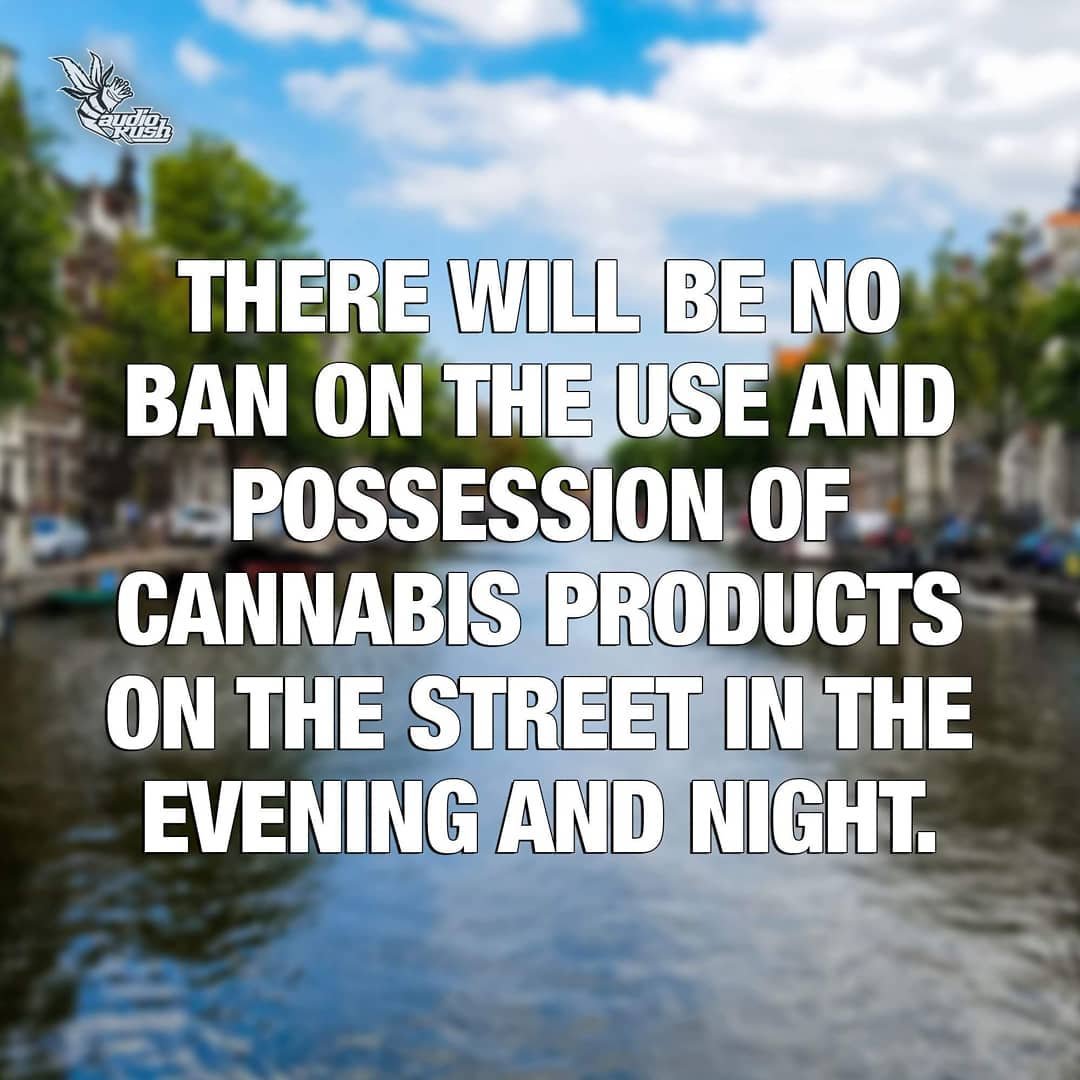
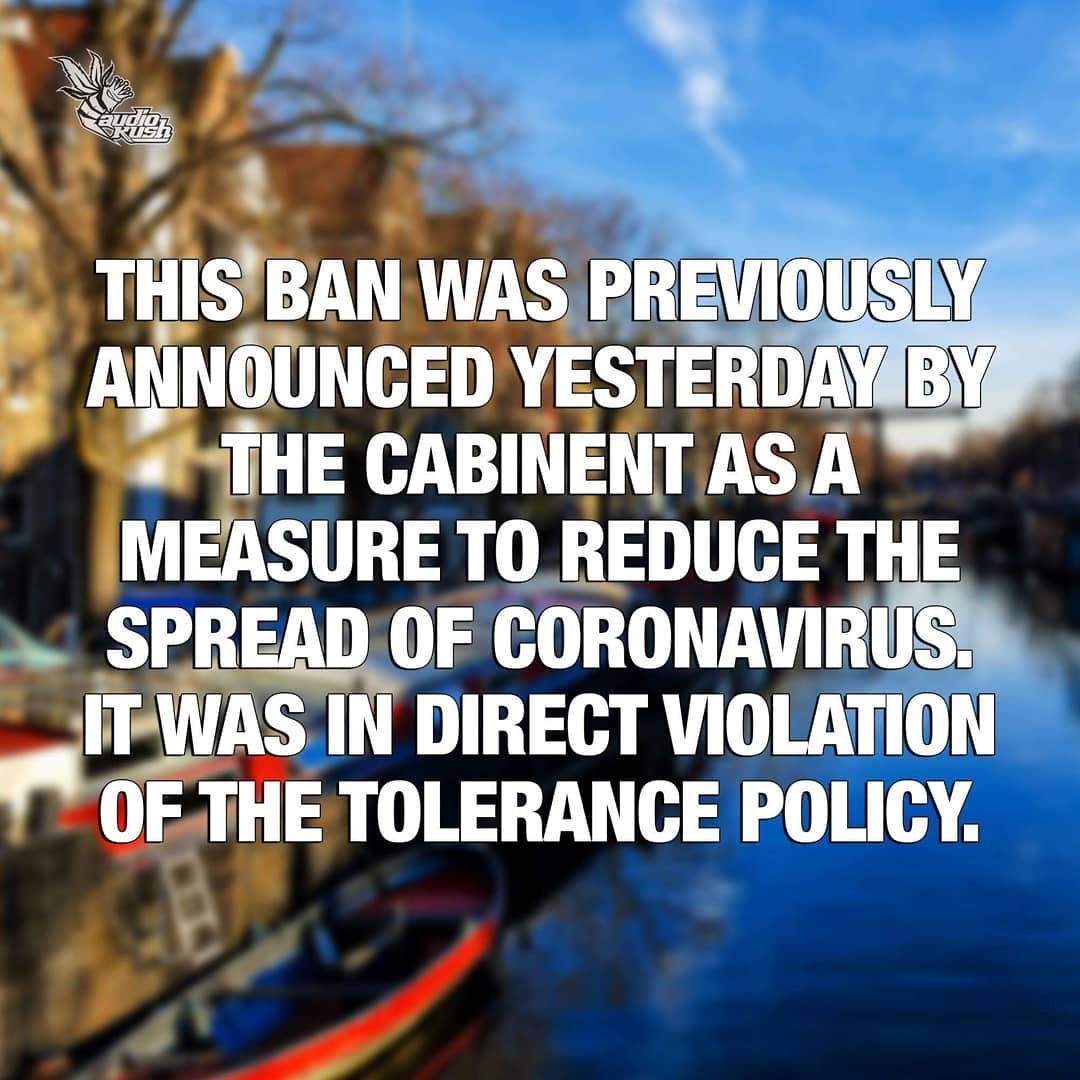
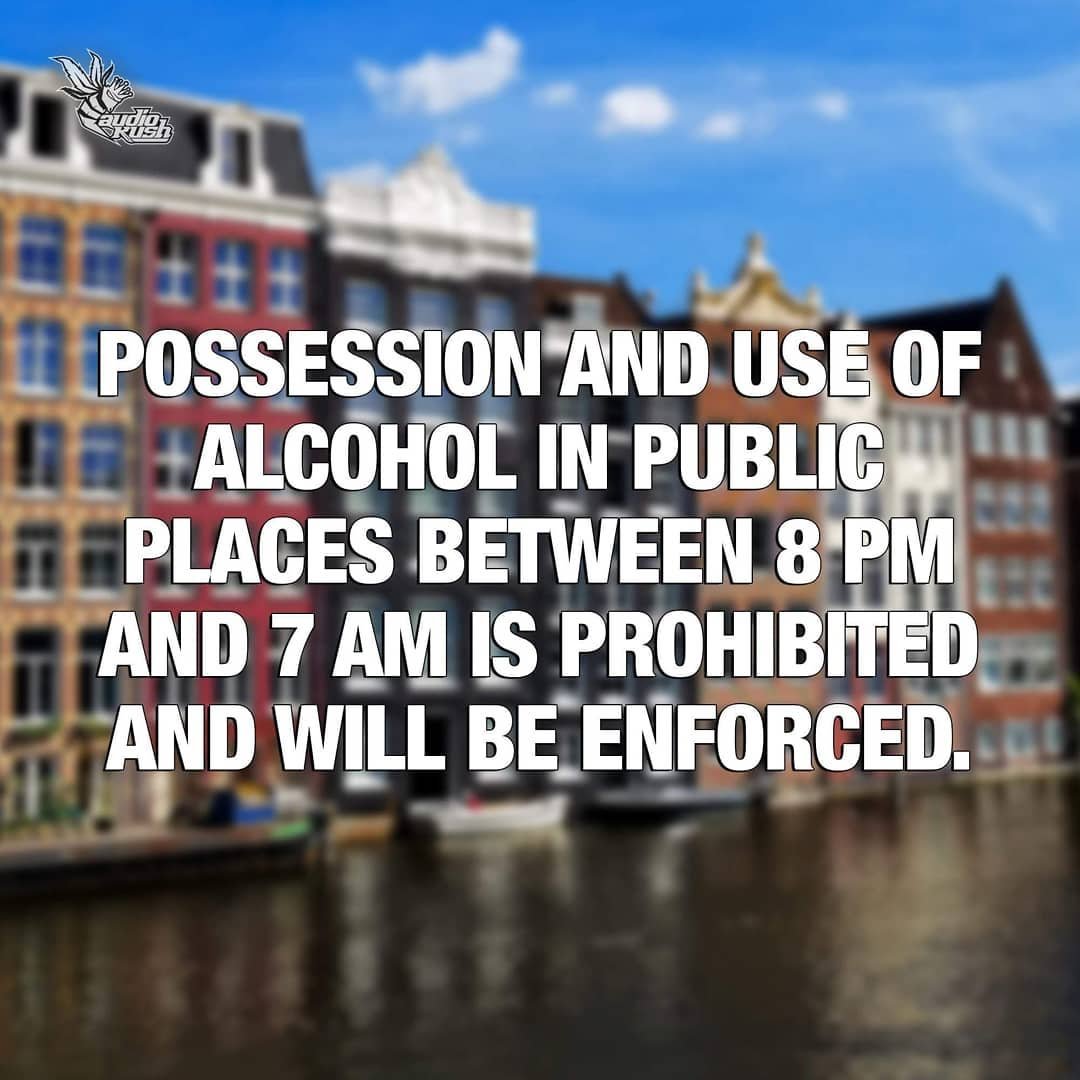
Updated October 14, 2020.
Beginning Wednesday, October 14 at 10 p.m. the Netherlands will begin a new phase of measures in attempt to quell another wave of Coronavirus infections. After 2 weeks, an evaluation will be completed to see if these measures will be extend or not.
A highlight of the measures include:
• Work from home unless there is not another option
• Coffeeshops will close at 8p.m.
• Coffeeshops will be open for takeaway only
• Restaurants, bars, and cafes will be open for takeaway only
• Masks are mandatory in all public spaces (applies to 13+)

Prime Minister Mark Rutte and Minister Hugo de Jonge addressed the nation Tuesday evening to address sky rocketing numbers of new Dutch coronavirus infections, which have been on the rise since September. This latest press conference comes in the wake of breaking news regarding an 89 year old Dutch woman who has died after becoming reinfected with coronavirus a mere 59 days after becoming symptomatic from her first infection, raising serious questions regarding the length of time COVID-19 antibodies and immunity last.
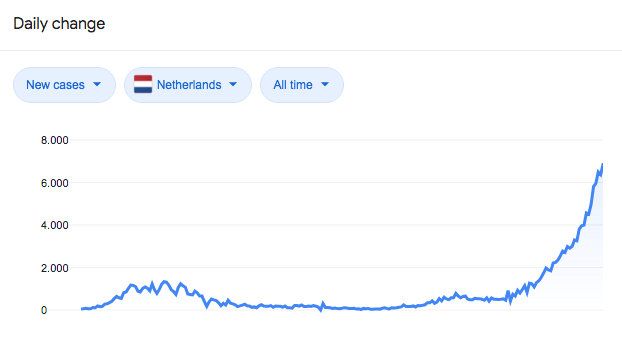
“The coronavirus has been given too much room to spread again. The cabinet decided today that stricter measures are needed to ensure that the number of infections decreases. We do this by intervening in those places where the risk of transmission of the virus is greatest. By limiting the number of contact moments and travel movements, supporting people in complying with the ground rules and stricter enforcement”, the Rijksoverheid said in a Tuesday evening statement. “More than we would like, the tightening of the measures has an impact on society and the economy. But this step is now necessary so that a new perspective will then arise: a society in which we keep the virus under control. It is crucial that we can keep 1.5 meters away from others and follow the ground rules. Everyone with complaints can be tested and people with a positive test result stay at home. This way, the greatest part of the infections can be prevented.”
These measures apply across the Netherlands from Wednesday 14 October at 22:00 (10:00 p.m.). They are set to continue until October 28, 2020. During this time, conditions will be monitored and procedures will be amended or prolonged as seen fit.
Full Outline of Netherlands COVID-19 Measures as of 10 p.m. 14 October, 2020
(Source: rijksoverheid.nl)
Groups:
-At home you receive a maximum of 3 people per day.
-In indoor areas where people are seated, a maximum number of people is 30.
-Indoors (not in the home situation) and outdoors, a group consists of a maximum of 4 people from different households.
-A household does not have a maximum number of people
The daily life:
-Work at home, unless there is no other option.
-From the age of 13, wear a face mask in public indoor areas and on public transport.
-In secondary education (VO), MBO and higher education (HO), everyone wears a mask outside of class.
-All food and beverage outlets close their doors. Pick up is still possible
The exceptions are:
Hotels for hotel guests
Funeral centers
Airports past the security check
-Locations with a combined function close the part with a catering function
-Retail stores close by 8:00 PM at the latest. Shopping evenings will be abolished.
-Food shops may remain open later.
-No more alcohol or soft drugs will be sold or delivered between 8:00 p.m. – 7:00 a.m.
-It is not allowed to carry or consume alcohol or soft drugs in public spaces between 20:00 and 07:00. (Amended 15 October, 2020)
-Events are prohibited, with the exception of:
Food markets
Trade fairs and conferences
Cinemas and theaters
Matches
Demonstrations, gatherings and meetings as referred to in the Public Events Act
-In the retail sector, agreements are made about strict compliance with the protocols. If it gets too busy, or if the ground rules are not followed, (part of) a location can be closed. Enforcement is being tightened up.
-At so-called transfer locations (for example monuments, libraries and museums), visits must take place on the basis of a reservation per period, with the exception of retail trade and markets for foodstuffs.
-Sports is only possible to a limited extent:
-For everyone over 18, sports are only allowed at a distance of 1.5 meters and only individually or in a team with no more than 4 people. Competitions are not allowed.
The exceptions are:
Top athletes with status in designated locations (such as Papendal)
Football players (including other personnel in “bubble”) of the Eredivisie and Eerste Divisie.
-For children up to 18 years old, team sports and mutual competitions with teams from their own club allowed.
-In addition to the sports canteens, showers and changing rooms are also closed.
Events are prohibited, with the exception of:
-Food markets
-Trade fairs and conferences
-Cinemas and theaters
-Matches
-Demonstrations, gatherings and meetings as referred to in the Public Events Act
To travel:
-Travel as little as possible
-Stay at your holiday address as much as possible
-Limit the number of trips and avoid crowds
-For abroad the following applies: follow travel advice from the Ministry of Foreign Affairs
There are no national travel restrictions at this time, yet the public is urged to travel as little as possible and to do so responsibly.
We encourage you to stay safe and to follow these measures to protect yourself and others. Let’s work together so we can return to a different way of life.
Updated September 20, 2020.
Coffeeshops to limit hours in response to new COVID-19 measures in 6 regions across Netherlands.
Coffeeshops will be limiting their opening hours and closing their doors by 12 a.m. (midnight). Some shops have also closed their smoking lounges in response to the latest outbreaks.
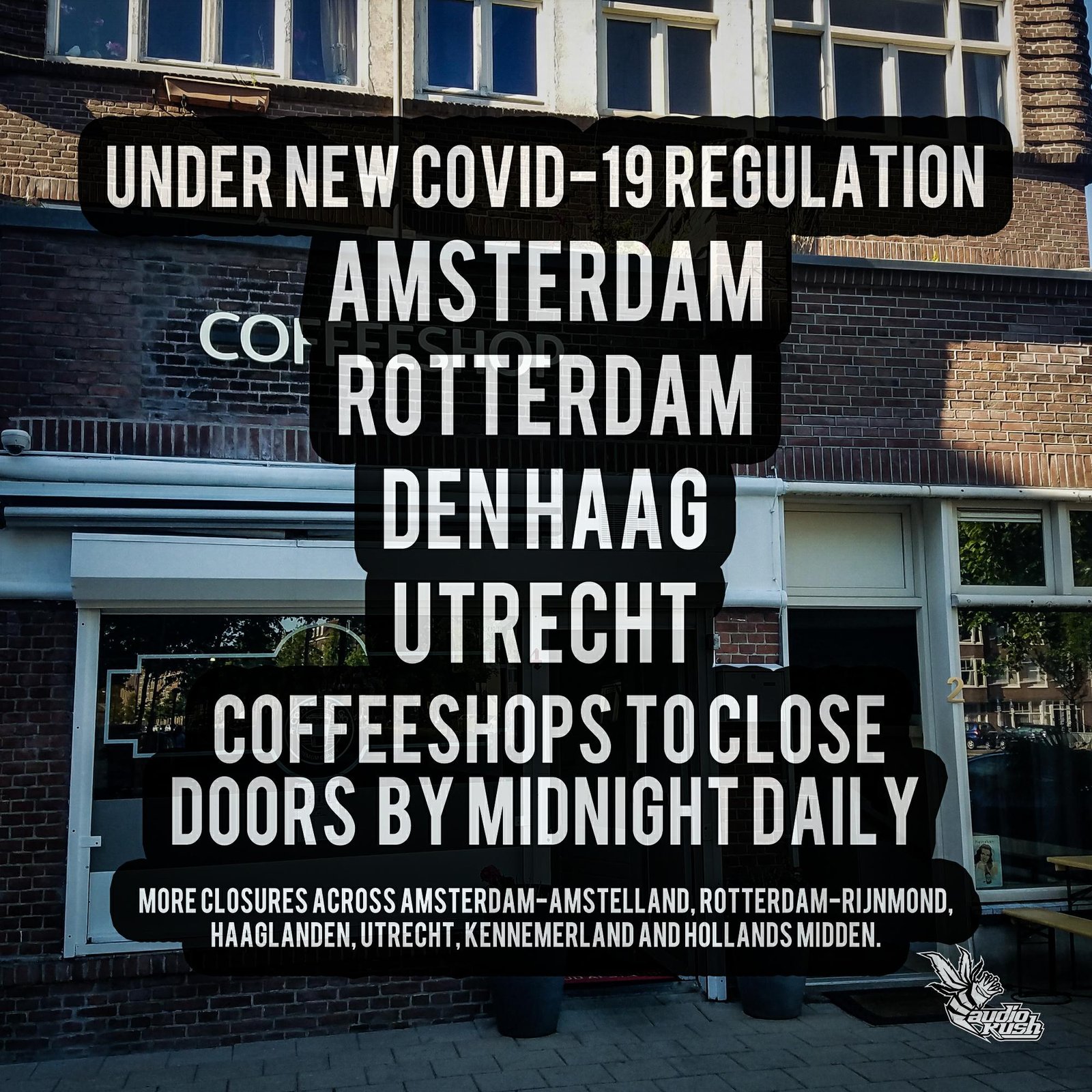
Updated August 14, 2020.
Want to sit at the coffeeshop? You must register your contact details.
Undercover corona checks will now be carried out in Amsterdam.
While several catering establishments in Amsterdam have been following corona measures, many others continue to break the rules. Gemeente Amsterdam stated this earlier today on Twitter, as they began to tighten up the enforcement. Expect agents in plain clothing to conduct corona checks at various catering establishments.
Updated August 13, 2020.
UK Imposes 14-day Quarantine For Travelers From Netherlands.
Updated August 7, 2020.
Caterers will have to collect contact details of all parties involved in a reservation. This is to ensure the ease of contact tracing in the event that there is an infection. In the case an infection is found, the restaurant will be forced to close for 2 weeks.
Updated August 1, 2020.
Updated July 1, 2020.
Coffeeshop smoking areas reopen after COVID-19 shutdown.
Updated June 25, 2020.
Updated March 16, 2020.
Coffeeshops remain open, the majority are now operating on a takeaway-only basis.
Updated March 15, 2020.
All Dutch schools, childcare, restaurants, coffeeshops to close for 3 weeks.
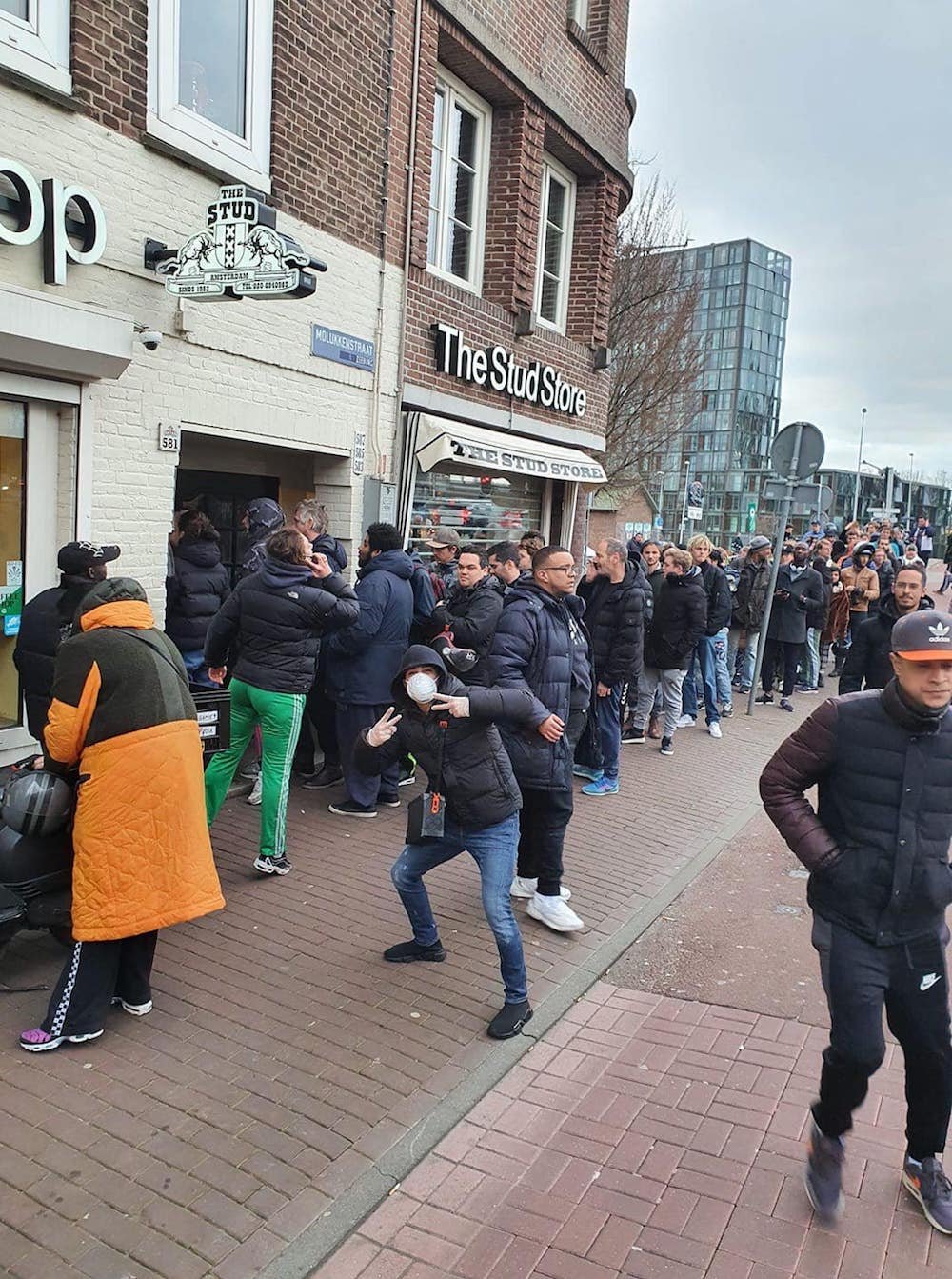
Prime Minister Mark Rutte will address the Netherlands on Monday to discuss the plan to combat the Corona Virus in further detail. Rutte’s address is scheduled to begin at 7 PM GMT+1.


